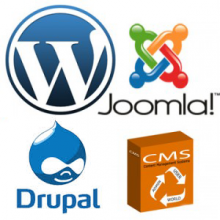
There are a lot of articles out there that will talk up how awesome a particular CMS is and another article with an equal number of complaints. A CMS is awesome, provided you‘ve chosen the right CMS for your end goals and have a professional helping you make the most of the software. While it’s nice to think that you can easily use a site CMS bundle right out of the box, the fact is that your site will be far more valuable to you if a professional assists in building it.
Here are some of the top CMS complaints and how to avoid their pitfalls.
CMS sites are too hard to learn
The degree of difficulty in using a CMS can vary based on the technical skill level of the user and the CMS chosen. A quality development firm will not only ensure that you get proper training on using your CMS and any customizations made for you, but will also provide some kind of detailed documentation for you to refer to. Beyond good documentation, most CMS platforms can be customized with a Dashboard that presents an easy to use interface for the client.
CMS sites have to be online in order to build and design them
While this is technically true, there are ways to mitigate this issue. First of all, if you already have a site but you are building a brand new CMS site to replace it, you can build on a development server. If you are working with a professional company, they will be able to build your site on a development server, allow you to go in and add content and make any changes necessary. Once you are satisfied with the site and ready to take it live, the site will be essentially exported and migrated over to your live hosting.
If you don’t currently have a site and are building your new CMS on a production server, live to the world, there are also ways to keep the public from seeing your site. Most CMS’s come with the ability to take the site ‘offline’. A page will display letting anyone who comes across it, that the site is temporarily down. This page can be customized by a professional to look and say whatever your brand messaging will be while the site is in progress.
Templates are too limiting
You are NOT limited to using templates when creating a CMS site. Custom templates can be created for any CMS and pre-built templates can be tweaked to suit your needs. Your website should be specifically branded for you, regardless of whether it’s on a CMS platform or not. This means that you’ll probably be hiring a professional to design your site anyway. The advantage of the CMS is that once your design is in place, the rest of the site will be user friendly enough for you to manage content. A traditional HTML site would not only require a design, but also the interaction of a professional for any changes to content in the future.
All Open Source CMS platforms are pretty much the same
There are 3 major open source CMS options and while each has become pretty robust, they each have a primary focus. Choosing the appropriate CMS for your needs is an important task. You have to look at what your needs are, how active the community is (how quickly will bugs be fixed?) and how extensive are the plug-ins/modules. To see a breakdown of the three major open source CMS platforms, click here.




